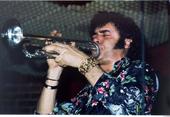Bill Chase (1934 - 1974) was an American trumpet player and leader of a jazz-rock fusion band that bore his name.
Bill Chase was born William Edward Chiaiese on October 20, 1934 to an Italian family in Boston, Massachusetts; his parents John and Emily changed their name to Chase, realizing Chiaiese was difficult to pronounce. Bill's father had played trumpet in the Gillette Marching Band and he encouraged his son's musical interests, which included a brief flirtation with violin lessons and several years as a fledling drummer. In his mid-teens Bill settled on the trumpet as his instrument of choice. After graduating from high school he began studying classical trumpet at the New England Conservatory, but he soon switched to the Berklee School of Music. While at Berklee in 1952, Chase attended his first Stan Kenton concert - featuring Maynard Ferguson on lead trumpet - and Bill was hooked on jazz from that time forward.
Chase began to build his reputation playing with Kenton and Ferguson, and during the 1960s he played lead trumpet in Woody Herman's Thundering Herd. Recordings of the Herman band from that time period, including Woody's Winners, Live in Antibes, Encore, 1963, My Kind of Broadway, Blue Flame, Live in Seattle, Somewhere, Live at Newport 1966, Heavy Exposure, Woody Herman & the Fourth Herd, and Jazz Hoot are considered some of the most exciting in the Herman discography. The band also filmed several television appearances for the program Jazz Casual. One of Chase's original charts from this period, "Camel Walk," was published in Downbeat magazine.
In 1970 he started his own band, known as Chase, which released its debut album Chase in early 1971. Bill Chase was joined by Ted Piercefield, Alan Ware, and Jerry Van Blair, three veteran jazz trumpeters who were also adept at vocals and arranging. They were backed up by a rhythm section consisting of Phil Porter on keyboards, Angel South on guitar, Dennis Johnson on bass, and Jay Burrid on percussion. Rounding out the group was Terry Richards, who was featured as lead vocalist on the first album. The album contains Chase's best-known song, "Get It On," which was released as a single and spent thirteen weeks on the charts starting in May of 1971. It features what Jim Szantor of Downbeat magazine called "the hallmark of the Chase brass - complex cascading lines; a literal waterfall of trumpet timbre and technique." The band received a Best New Artist Grammy nomination, losing the award to Carly Simon.
Chase released their second album, Ennea, in 1972; the album's title is the Greek word for nine, a reference to the nine band members. The original lineup changed midway through the recording sessions, with Gary Smith taking over on drums and G. G. Shinn replacing Terry Richards on lead vocals. Although the first Chase album sold nearly 400,000 copies, Ennea was not as well received by the public. A possible reason for this may have been the shift of focus away from the trumpet section. As Bill Chase put it in a Downbeat interview, "I don't want people to be heavily conscious of a trumpet section. They should just hear good things, but not be clobbered over the head with brass." A single, "So Many People," received some radio play, but the side-two-filling "Ennea" suite, with its tightly-chorded jazz arrangements and lyrics based on Greek mythology, was less radio-friendly.
Following an extended hiatus, Chase reemerged early in 1974 with the release of Pure Music, their third album. With an entirely new lineup, but keeping the four-trumpet section headed by Bill Chase, the group moved further from the rock idiom, placing their focus more heavily on jazz. Variety magazine said that Pure Music was "probably Chase's most commercial effort, and their brand of jazz could have a commercial impact." The songs were written by Jim Peterik of the Ides of March, who also sings on the two songs on the album with lyrics, backing up singer and bassist Dartanyan Brown.
Work began on a fourth studio album in mid-1974. However, on August 9, 1974, while enroute to a scheduled performance at the Jackson County Fair, Bill Chase died in a plane crash in Jackson, Minnesota. Also killed along with the pilots were keyboardist Wally Yohn, drummer Walter Clark, and guitarist John Emma. With the death of Bill Chase came the death of the group Chase. (Ironically, as the first song on Chase is called "Open Up Wide," the last song on Pure Music is called "Close Up Tight.")
In 1977 a Chase tribute band (composed primarily of the original lineup, plus Walt Johnson as the fourth trumpeter) recorded an album entitled Watch Closely Now.
-Wikipedia
